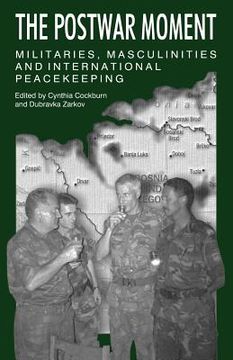Share
the postwar moment: militaries, masculinities, and international peacekeeping
Cynthia Cockburn
(Illustrated by)
·
Dubravka Zarkov
(Illustrated by)
·
Lawrence & Wishart
· Paperback
the postwar moment: militaries, masculinities, and international peacekeeping - Cockburn, Cynthia ; Zarkov, Dubravka
£ 16.19
£ 17.99
You save: £ 1.80
Choose the list to add your product or create one New List
✓ Product added successfully to the Wishlist.
Go to My WishlistsIt will be shipped from our warehouse between
Monday, July 01 and
Wednesday, July 03.
You will receive it anywhere in United Kingdom between 1 and 3 business days after shipment.
Synopsis "the postwar moment: militaries, masculinities, and international peacekeeping"
A postwar moment is one of promise - but too often of missed opportunities. Will peace bring a democratic, inclusive and equal society? This depends on many factors, but the contributors to this book argue that one of them - crucial but often overlooked - is the importance accorded to transforming gender power relations. Through a focus on two countries, Bosnia and the Netherlands, linked through a "peace-keeping operation", the contributors illuminate the many ways in which processes of demilitarisation and peace-keeping are structured by notions of masculinity and femininity. The Dayton Peace Agreement failed to acknowledge the gendered nature of the war it ended. Gender was also neglected by the many powerful international institutions and agencies which arrived in Bosnia-Herzegovina in 1995 to pacify and administer the war-torn country. Several chapters in the book consider these shortcomings in the Bosnian postwar moment, and the way they have impeded local women's efforts to reshape their world. The Dutch contingent of the UN peace-keeping forces was widely held responsible for failing to prevent the massacre by Bosnian Serb forces of thousands of Bosnian Muslim men in Srebrenica. The self-questioning provoked in the Netherlands by this event here becomes a rich source of insight into relationships between soldiering and masculinities, war-fighting and peace-keeping. Show More Show Less
- 0% (0)
- 0% (0)
- 0% (0)
- 0% (0)
- 0% (0)
All books in our catalog are Original.
The book is written in English.
The binding of this edition is Paperback.
✓ Producto agregado correctamente al carro, Ir a Pagar.

